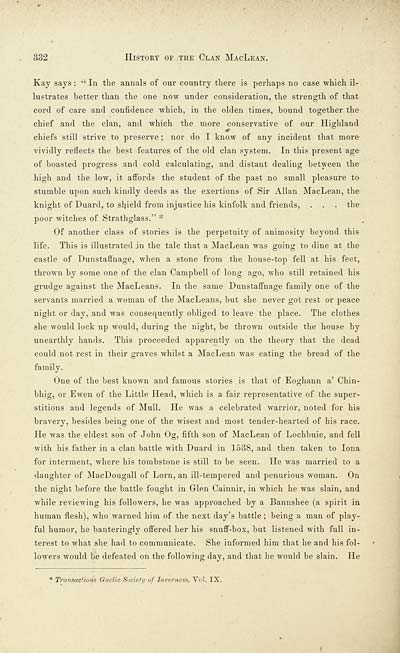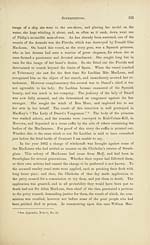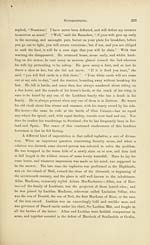History of the Clan MacLean from its first settlement at Duard Castle, in the Isle of Mull, to the present period
(338) Page 332
Download files
Complete book:
Individual page:
Thumbnail gallery: Grid view | List view

332 History of the Clan MacLean.
Kay says : " In the annals of our country there is perhaps no case which il-
lustrates better than the one now under consideration, the strength of that
cord of care and confidence which, in the olden times, bound together the
chief and the clan, and which the more conservative of our Highland
chiefs still strive to preserve ; nor do I know of any incident that more
vividly reflects the best features of the old clan system. In this present age
of boasted progress and cold calculating, and distant dealing between the
high and the low, it affords the student of the past no small pleasure to
stumble upon such kindly deeds as the exertions of Sir Allan MacLean, the
knight of Duard, to shield from injustice his kinfolk and friends, . . . the
poor witches of Strathglass." *
Of another class of stories is the perpetuity of animosity beyond this
life. This is illustrated in the tale that a MacLean was going to dine at the
castle of Dunstaffhage, when a stone from the house-top fell at his feet,
thrown by some one of the clan Campbell of long ago, who still retained his
grudge against the MacLeans. In the same Dunstaffnage family one of the
servants married a woman of the MacLeans, but she never got rest or peace
night or day, and was consequently obliged to leave the place. The clothes
she would lock up would, during the night, be thrown outside the house by
unearthly hands. This proceeded apparently on the theory that the dead
could not rest in their graves whilst a MacLean was eating the bread of the
family.
One of the best known and famous stories is that of Eoghann a' Chin-
bhig, or Ewen of the Little Head, which is a fair representative of the super-
stitions and legends of Mull. He was a celebrated warrior, noted for his
bravery, besides being one of the wisest and most tender-hearted of his race.
He was the eldest son of John Og, fifth son of MacLean of Lochbuie, and fell
with his father in a clan battle with Duard in 1538, and then taken to lona
for interment, where his tombstone is still to be seen. He was married to a
daughter of MacDougall of Lorn, an ill-tempered and penurious woman. On
the night before the battle fought in Glen Cainnir, in which he was slain, and
while reviewing his followers, he was approached by a Bannshee (a spirit in
human flesh), who warned him of the next day's battle ; being a man of play-
ful humor, he banteringly offered her his snuff-box, but listened with full in-
terest to what she had to communicate. She informed him that he and his fol-
lowers would be defeated on the following day, and that he would be slain. He
* Transactions Gaelic Society of Inverness, Vol. IX.
Kay says : " In the annals of our country there is perhaps no case which il-
lustrates better than the one now under consideration, the strength of that
cord of care and confidence which, in the olden times, bound together the
chief and the clan, and which the more conservative of our Highland
chiefs still strive to preserve ; nor do I know of any incident that more
vividly reflects the best features of the old clan system. In this present age
of boasted progress and cold calculating, and distant dealing between the
high and the low, it affords the student of the past no small pleasure to
stumble upon such kindly deeds as the exertions of Sir Allan MacLean, the
knight of Duard, to shield from injustice his kinfolk and friends, . . . the
poor witches of Strathglass." *
Of another class of stories is the perpetuity of animosity beyond this
life. This is illustrated in the tale that a MacLean was going to dine at the
castle of Dunstaffhage, when a stone from the house-top fell at his feet,
thrown by some one of the clan Campbell of long ago, who still retained his
grudge against the MacLeans. In the same Dunstaffnage family one of the
servants married a woman of the MacLeans, but she never got rest or peace
night or day, and was consequently obliged to leave the place. The clothes
she would lock up would, during the night, be thrown outside the house by
unearthly hands. This proceeded apparently on the theory that the dead
could not rest in their graves whilst a MacLean was eating the bread of the
family.
One of the best known and famous stories is that of Eoghann a' Chin-
bhig, or Ewen of the Little Head, which is a fair representative of the super-
stitions and legends of Mull. He was a celebrated warrior, noted for his
bravery, besides being one of the wisest and most tender-hearted of his race.
He was the eldest son of John Og, fifth son of MacLean of Lochbuie, and fell
with his father in a clan battle with Duard in 1538, and then taken to lona
for interment, where his tombstone is still to be seen. He was married to a
daughter of MacDougall of Lorn, an ill-tempered and penurious woman. On
the night before the battle fought in Glen Cainnir, in which he was slain, and
while reviewing his followers, he was approached by a Bannshee (a spirit in
human flesh), who warned him of the next day's battle ; being a man of play-
ful humor, he banteringly offered her his snuff-box, but listened with full in-
terest to what she had to communicate. She informed him that he and his fol-
lowers would be defeated on the following day, and that he would be slain. He
* Transactions Gaelic Society of Inverness, Vol. IX.
Set display mode to:
![]() Universal Viewer |
Universal Viewer | ![]() Mirador |
Large image | Transcription
Mirador |
Large image | Transcription
Images and transcriptions on this page, including medium image downloads, may be used under the Creative Commons Attribution 4.0 International Licence unless otherwise stated. ![]()
| Histories of Scottish families > History of the Clan MacLean from its first settlement at Duard Castle, in the Isle of Mull, to the present period > (338) Page 332 |
|---|
| Permanent URL | https://digital.nls.uk/94805942 |
|---|
| Description | A selection of almost 400 printed items relating to the history of Scottish families, mostly dating from the 19th and early 20th centuries. Includes memoirs, genealogies and clan histories, with a few produced by emigrant families. The earliest family history goes back to AD 916. |
|---|

